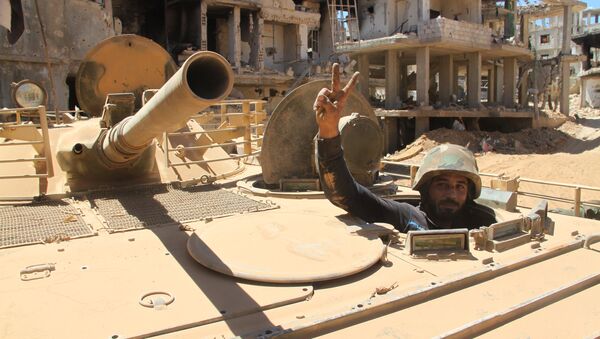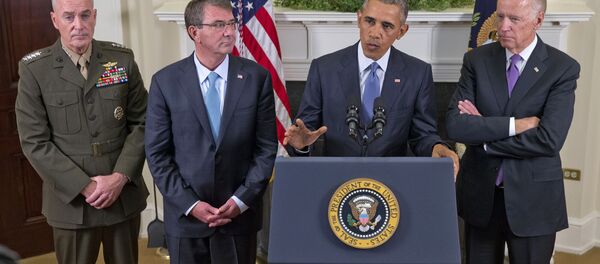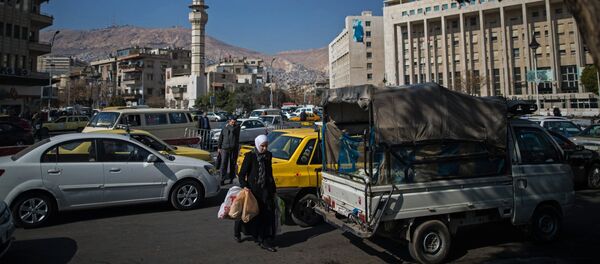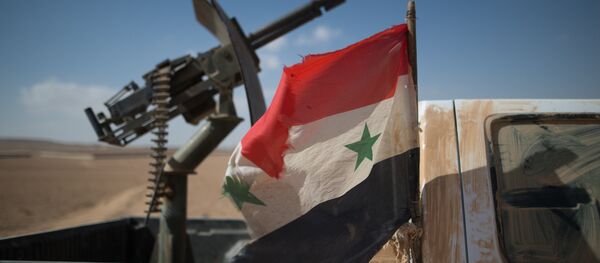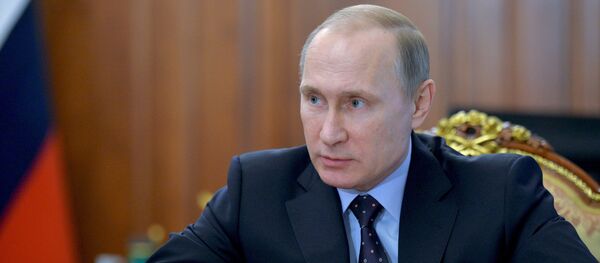On Monday, Russian and US diplomats announced plans for a ceasefire between the Syrian Army and opposition forces, set to take effect at midnight on February 27.
Receiving high praise from international observers, the ceasefire plan, which does not apply to the most powerful radical Islamist groups operating in the country – Daesh (ISIL) and the Nusra Front, has nonetheless led to worries from some analysts over the details of its implementation.
In his analysis, published in the Russian business magazine Expert earlier this week, Skarabahaty recalled that "a series of major victories by the Syrian Army over the past month have created the appearance of a well-oiled military machine ready to clear the country from every remaining terrorist. Amid the background of the ceasefire, endorsed by the leaders of Russia and the US, some experts have plunged into grim speculation about a Russian betrayal of Damascus, while others rushed to build grandiose plans for an offensive deep into territories controlled by Daesh (ISIL)."
At the same time, "at the beginning of the week, militants from the self-declared caliphate" cast aside the predictions and planning of both sides, "organizing a serious offensive in the center of the country. In order to stop the breakthrough and unlock the 'lifeline' linking Aleppo with the coast, it became necessary for the Syrian Army to transfer significant forces from the north."
This, Skarabahaty suggests, is a clear indication that "Assad's army still has a weakened immune system following a serious illness which almost finished off the armed forces and the country as a whole" over the last five years. "And under such conditions, a conditional truce no longer seems like such a silly idea."
Three weeks of fighting in northern Syria, mapped by @miladvisor, animated by @MahmoudAyad1984 pic.twitter.com/6y7eJFLSGU
— Piotr Zalewski (@p_zalewski) 21 февраля 2016 г.
Damascus's Advance
First things first, the analyst writes, "the rate of advance by government troops over the last three weeks boggles the imagination." The front line, he says, "has been condensed almost by half, from 110 km to 60 km. In many respects, this was the result of the rapid formation and tightening of the pocket to the east of [the city of] Aleppo. In a matter of days the Syrian Army's spec ops 'Tigers' group, with the support of the 'Desert Hawks' and the 'Cheetah' 3rd Special Forces Group, surrounded territories held by Daesh and speedily liberated several dozen villages."
2nd time Russian mil. leadership award Col.Suhail Al-Hassan and Tiger forces for latest victories in E Aleppo pic.twitter.com/uvtplJa7Bg
— Военный Советник (@miladvisor) 21 февраля 2016 г.
The speed of the operation allowed the army to save the local thermal power plant, "undoubtedly one of the symbols of Aleppo. The Syrian government has promised to restore the plant in the near future, and to put an end to the power shortages long-suffered by the north of the country," Skarabahaty recalled.
Syrian forces raising their flag in the thermal power plant in eastern Aleppo, #Syria. pic.twitter.com/KcKIM9ZQeR
— Haidar Sumeri (@IraqiSecurity) 21 февраля 2016 г.
#SyrianArmy #TigerForces expelled #ISIS from #Aleppo power plant, plans to restart power supply to region #Syria pic.twitter.com/kgOJhz3evr
— David Feeney (@Feeney4Batman) 26 февраля 2016 г.
"The significance of the victory in eastern Aleppo cannot be overestimated. It means not only a shortening of the front line, but also regaining control over a 15 km section of the Aleppo-Raqqa highway, thus improving logistics between the city and the Kweiris airbase," liberated by the combined efforts of the Syrian Army, Russian air power, and Iraqi and Hezbollah volunteer units late last year.
"Prior to this, the only route to supply the air base from Aleppo was 90 km long. The troops which have been freed up [by the operation] can now be involved in others."
The Limits of the SAA's Resources
At the same time, Skarabahaty notes, "other sections of the front in Aleppo province have become static. In the north, the Kurdish advance to the Turkish border and toward the last major town of Azaz has been stopped. Turkey quickly pumped hundreds of militants into the buffer zone, and Russian air power has reduced its activity in the area, apparently seeking not to provoke Ankara."
"A much-anticipated but tactically pointless army offensive into the city of Aleppo has also not taken place; fighting in the megapolis would result in heavy losses for the army, and the city's utter destruction."
#Kinsibba #SAA soldiers showing "V "Victory sign 🇸🇾🇷🇺🇮🇷 #HezbollahTV #HDhttps://t.co/UGmQDckCQP pic.twitter.com/V9u0qtZ67R
— ☫Plutonium General ☫ (@IRGC_QF) 18 февраля 2016 г.
At present, the analyst suggests, the concentration of forces near Sirmaniyah, Hama province, indicates that the army will be making steps to liberate the major town of Jisr al-Shughour, captured by the Jaish al-Fatah ('Army of Conquest') Islamists last May.
"The Syrian Air Force has scattered thousands of leaflets calling for Jaish al-Fatah to surrender the population center…Idlib may find itself in a vice if the terrorists are simultaneously attacked by the Syrian Army and by Lebanese and Iranian volunteers from the north outside Aleppo."
Syrian Army Not Out of Danger Yet: Daesh Shifts to Sabotage and Guerilla Tactics
The Islamist-led offensive in Aleppo province, Skarabahaty explains, highlights exactly why it's too early to break out the champagne in celebration. Syria's logistical and geographical characteristics, the analyst explains, feature "many desert areas, dissected by roads, allowing militants to threaten logistical communications on a regular basis."
"This time, a third of Assad's army, the Aleppo group, consisting of tens of thousands of soldiers, was caught in a sort of pocket" following the Islamists' offensive. Militants from the Islamist group Jund al-Aqsa, coordinating with Daesh, attacked the 'highway of life', capturing several villages and the town of Khanasir with a garrison of several hundred soldiers. Over 30 kilometers-worth of highway were lost," with a Syrian Army counteroffensive managing to recapture all but 7 km of the road, reports suggest.
Attacks on Khanaser road came from both sides, Jund al Aqsa from the west and ISIS from the east pic.twitter.com/TD8XnTNaRi
— Abdurahman Hark (@Abduhark) 22 февраля 2016 г.
Khanasir's defenses, the analyst explains, may have collapsed to the terrorists in part due to the activation of 'dormant' Daesh cells, "who attacked the garrison from inside."
On the whole, "if on Monday it seemed that the offensive was a series of small pinprick attacks, by Tuesday it became clear that the terrorists had organized a well-organized offensive supported by large numbers of fighters."
"As a result, the Tigers, one of the Syrian Army's most combat-ready brigades, were removed from the north, and will have to clear [the highway] instead of organizing a new operation. It's entirely possible that part of the force carrying out an offensive around Tabqa, [in the northeastern Daesh-controlled Al-Raqqa province] may be called back, because logistics may now be the militants' main target, after their failures in eastern Aleppo and near Deir ez-Zor."
Squeezed from the east and the west, and by Kurdish forces in the north, Daesh "seems to be shifting toward the tactics of guerrilla warfare and sabotage, hence the recent terrorist attacks in Homs and Damascus, which killed two hundred people. Tactically senseless bombings in civilian areas have not improved Daesh's position on the front, but may undermine the growing consolidation of Syrian society and the Assad government."
Why This Ceasefire is Different
"In 2012," Skarabahaty recalls, "rebels seized the Syrian city of Homs. The Syrian Army began an operation, but was stopped by political pressures from the West against the Syrian government. As a result, Damascus lost control over Homs and other territories, and foreign fighters and arms began flowing into the country through the borders with Turkey and Jordan. In Iraq, Daesh appeared, smashing the American-trained Iraqi army, and gaining access to a huge arsenal. The second truce, in 2014, nearly cost Assad his head, resulting in the loss of 80% of the country. What is it that allows the legitimate Syrian government to count on a different outcome this time?"
First off, "the peace process launched on Moscow's initiative and agreed to by Washington, has all the signs of a serious and well-thought out initiative. This is demonstrated by the high level at which the agreement was reached, [including] Vladimir Putin's speech and the official expression of support in Damascus."
"A truce for a period of two weeks, with the possibility of extension, will come into force on February 27, regardless of which anti-government militants support it. And here is a fundamental factor, which will eventually help weed out the 'moderate' rebels from the radicals, and end the accusations against the Russian-Syrian coalition about its destruction of the opposition."
"The main issue with which Washington will now be engaged," Skarabahaty says, "is the determination of the areas where fighting will be stopped, and listing the small groups subject to the agreement. This will not be an easy task. The Syrian front is not just a layer cake controlled by various groups. Sometimes it is impossible to determine which group militants belong to, and the terrorists themselves easily change their ideological colors, depending on the political situation and the favor of their sponsors."
"However, the ceasefire puts the militants into a stalemate: don't agree to the truce, and be listed as a radical, subject to destruction. Agree, and be listed as a traitor by your 'principled' radical neighbors. Therefore, here, like it or not, rebels will be forced to take the Syrian Army's side."
"The unintelligible palette of terrorism in Syria has long played into the hands of Assad's opponents. Now, Russia is trying to sort this mess into its component parts, and to turn the militants against one another," the analyst emphasizes.
Furthermore, parliamentary elections have been scheduled for April 13. "This means that in the militant--occupied territories entering into a truce, it will be necessary to provide access to government officials for the organization of voting and political forces for campaigning."
"Finally," Skarabahaty writes, "Bashar Assad recently announced an amnesty for all former soldiers who deserted or went over to the enemy…The ceasefire is a good opportunity to work with them through various channels, maybe not for Assad, but for Russian advisors."
Ultimately, the analyst suggests, the fundamental issue is not about those groups and territories which agree to the ceasefire, but those territories in which battles will continue – against Daesh, Nusra Front, and other militant groups classified as terrorists by the UN Security Council, including Ahrar ash-Sham. And given that these forces operate from Idlib to Aleppo, from Hama to Homs, this means that "fighting on almost all fronts will continue."
All in all, Skarabahaty notes, "few could have predicted the plans of the Russian-Syrian coalition, and, moreover, could see the real condition of Assad's forces. Four months ago, our Western partners and a host of domestic prophets predicted a second Afghanistan for Russia. Today, we are allowing Washington not to lose face, and to play by our rules. The price? One regiment of the Russian Aerospace Defense Forces."

